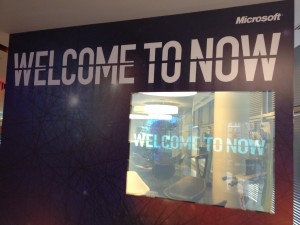“Breaking News might be documentary theatre. It might be more technically absorbing than (strictly speaking) poetically engaging or playful. It might, in truth be a very long way from Aeschylus. But Aeschylus was an inventor, a radical maker, two and a half thousand years ago, of a new thing called drama. In all their work, and most ambitiously to date in Breaking News, Rimini Protokoll have created live spectacles that are similarly new for the media-orientated 21st century.” (James Woodall, Breaking News programme, 2009)
A friend recently went on holiday and emailed another of our friends an update: she had redefined the trip as ‘educational visit’ and now was enjoying it much better.
I undertook a similar exercise at the theatre at the weekend: once I’d redefined ‘Breaking News’ as two hours (without an interval) of informative, rather than necessarily entertaining, activity, I was much more settled in my seat at the Theatre Royal in Brighton last Saturday.
Rimini Protokoll is the German company (‘the sort of outfit that probably could come only from Germany’), except they don’t call themselves a ‘company’, which produces Breaking News, their latest ‘documentary’ theatre endeavour – visiting Brighton for its UK premiere.
“[G]enerally, they use neither actors nor published texts; and because they do not really consider themselves a company. So what is left? What are they? What do they make?”
Good question from theatre critic, James Woodall, in his introductory notes in the programme. On this occasion, Rimini Protokoll have brought together eight international ‘news people’, all based in Germany, onto one stage, to live-interpret the news from their variously angled satellite dishes. The ninth contributor is an exception: Ray, from Ship Street in Brighton. Perhaps they found him in the Cricketers.
The company improvises in a ‘arrangement of stage spontaneity’ – and this is the first time it has been done in English – their reactions to, and interpretations of, the news on various international news channels that they consume at their individual televisions, or computer (in the Icelander’s case). Intermittently, they take turns to ascend a podium to read extracts from Aeschylus’ The Persions.

So, what did I learn from my educational excursion to the theatre? These are some of the nuggets gleaned:
- Iceland likes a giggle during its news: The Icelanders take the end of the news bulletin ‘lollypop’ very seriously: for Saturday’s performance, we caught an item on the success of the Icelandic Symphony Orchestra’s Maximus the Musical Mouse. It’s very important that ‘you don’t leave your news audience depressed’, explains Simon Birgisson, who was once an investigative journalist for the DV newspaper. I was also tickled by Iceland’s TV channel history: its first ever station, Sjónvarpið, translated directly as ‘television’. Its second was called 2.
- Al Jazeera has its critics: Djengizkhan Hasso, a Kurdish interpreter, and president of the Executive Committee of the Kurdish National Congress, criticised the channel for its emotive use of language in some of its reports. He also added that it would be very difficult to perform a play like Breaking News in an Arab country. Hasso’s performance was particularly memorable for the role-play of the time he met George Bush. He told the other actors what they had to say, and they solemnly repeated it back, so the audience got each segment of the conversation twice.
- What counts as a high ‘alarm’ story for press agencies is very subjective. Andreas Osterhaus, a news editor at Agence France Presse (AFP) in Berlin said he raised such an alarm on the day of Benazir Bhutto’s assassination, but his colleagues thought he had acted a little hastily. Previous alerts included the Princess Diana car crash, the attacks on the World Trade Center in 2001, and the capture of Saddam Hussein.
- We also learnt that Sushila Sharma-Haque, who watches various Indian and Pakistani, as well as German, news channels, goes to bed at 10pm promptly. She did just this on the night of the performance, making at an early exit from the stage at around 9.30pm. She did, however, pop back to take a bow.
Related links:

